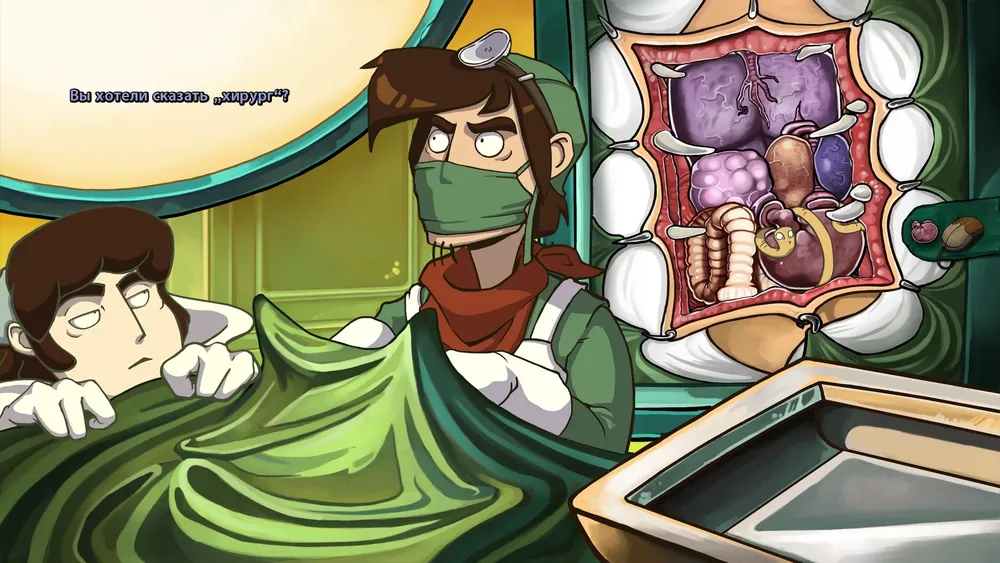
I genuinely don’t think any harm or offense was meant by such jokes, but if Daedalic was aiming for ironic satire… they shot far too wide. Some of the jokes are borderline racist/misogynistic, such as when Rufus ‘sells’ a black female character to become an organ grinder’s ‘monkey’, complete with jiggling, partially exposed breasts. Sadly, the humour misses its mark as often as it hits it. The mid-point plot twist is a genuine surprise that presents the previous two games in an entirely different light, and the Marmite ending will have players talking for a long time to come.
Goodbye deponia series#
The Deponia series has never had a particularly strong focus on telling a deep and meaningful story – so it’s somewhat surprising that Goodbye Deponia not only feels quite story-heavy, but contains some genuinely shocking and emotional moments too.

When everything does start to click into place it’s immensely satisfying (and the majority of the puzzles are very well thought out despite their twisted logic), but I imagine most players will find themselves taking a peek at an online walkthrough at some point due to feelings of frustration. It doesn’t help that some of the puzzles twist logic almost to breaking point. The end result is so much choice and freedom that the game all too often grinds to a halt. Yet each Rufus has numerous tasks to accomplish and not all of these are made particularly clear. The three versions of Rufus eventually find a way to share items between each other and this is handled extremely well.
Goodbye deponia full#
Whereas the Hotel Menetekel is refreshingly small in scope (the somewhat intimidating scope of Chaos on Deponia could be overwhelming at times), Porta Fisco is crammed full of locations, hotspots and characters. It an interesting reversal of the ‘three personalities of Goal’ scenario from the previous game and it certainly adds to the range of comedic and gameplay possibilities – yet the idea does bring with it its own unique set of problems. The Hows and Whys won’t be spoiled here but the explanation is surprisingly sophisticated and goes a long way towards explaining why Rufus is always such a jerk. It now becomes necessary to include a minor spoiler for reviewing purposes – Rufus ends up cloning himself and three different versions of the character find themselves separated throughout the city. However, this location only lasts for the first few hours of the game, with the advancing plot eventually taking our hero to the ruined city of Porta Fisco, home to the Upper Ascension Station and the last highboat to Elysium – and this is where the real meat of Goodbye Deponia resides. It’s great fun chatting to the hotel guests, avoiding Cletus and wreaking all manner of havoc. The service sucks, the rooms stink and even worse, it’s not long before Rufus’s uncanny lookalike and arch-nemesis Cletus checks in! This first act is open enough to encourage exploration without becoming overwhelming and the puzzles, though zany and odd, flow nicely. Sadly, Rufus is the one making the decisions! Although he somewhat manages to salvage the situation through pure luck (and with the help of Rufus’s biggest fan, Barry), the group eventually ends up walking wearily along the rails to a nearby building – the Hotel Menetekel.Īlthough the hotel looks quite small at first, it is made up of several different levels and many different rooms. After Bozo’s cutter ends up on the Organon monorail, Rufus and Goal (along with Bozo and Doc) find themselves in a life-or-death situation where decisions have to be made fast.

Goodbye Deponia begins (after the by now compulsory ‘ironic’ tutorial stage) with a linear series of action sequences that cleverly use traditional point-and-click adventure game mechanics to aid progression. The third and final instalment of the Deponia trilogy (closely following Deponia and Chaos on Deponia), players must once again take control of sardonic hero Rufus as he attempts to reach the floating paradise city of Elysium and prevent the destruction of his home planet. Goodbye Deponia is a point-and-click adventure game developed by Daedalic Entertainment.


 0 kommentar(er)
0 kommentar(er)
